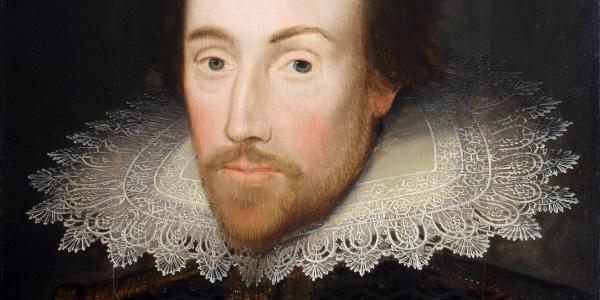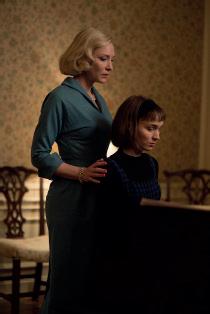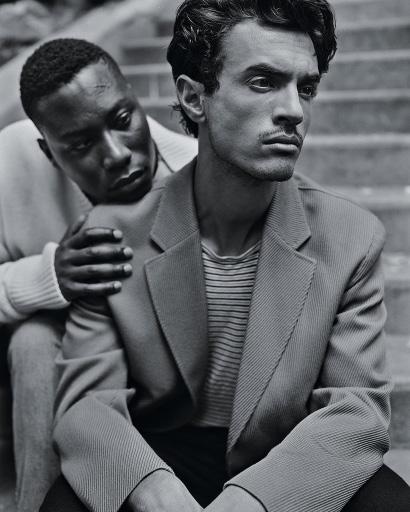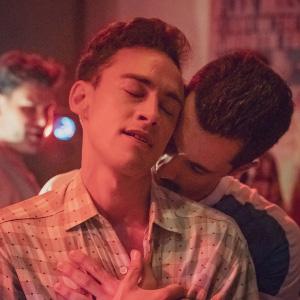
14 minute read
In The Middle with Ejiro Imiruaye
The Greatest Fictional Queer Romances
In The Middle is celebrating LGBTQ+ History Month in this issue but, with the smell of Valentine’s Day roses still lingering in the air, when would be a better time to add a bit of Although February 14th is often as hetero
Advertisement
Johnny & Gheorghe - God’s Own Country
beautiful Yorkshire Dales, Frances Lee’s debut Romanian migrant worker blossom in the face
Nomi & Amanita – Sense8
and, quite frankly, we all wish we had what

Image: shakespeare.org.uk Shakespeare & The “Fair Youth” – The Sonnets

inclusion of one of literature most debated beauty - ‘A woman’s face with nature’s own the creation of some of the most romantic
Carol & Therese - Carol
Todd Haynes’ romantic drama, based on a smile and moment of sustained eye contact
Mitch & Cam – Modern Family
century sitcom with its biting social commentary, bold and barmy cast of characters and its takedown of the traditional nuclear family husbands and fathers who show the highs and
David and Giovanni – Giovanni’s Room
a young American and an Italian bartender which ultimately brings about a tragic end to
Achilles and Patroclus – The Iliad
Image: IMDb bring a tear to the eye of the most stone-he
Alex gibbon

A new rendition of Giovanni‘s Room, Image: New York Times
It’s a Sin Not to Watch it‘s a sin
Channel 4 has recently remini-series, It’s a Sin. The er, Olly Alexander) and queer and excited to AIDS crisis drastically imfriends alongside the gay The show illustrates the chotomy of a communi the darkness and dread
show tracks the life of 1981 to 1991. The lead by Years & Years singhis friends are young, nity and life in London. of Ritchie and his comthe early years of the We see how the HIV/ community as a whole. heart-wrenching dity that are at once so ment of youth, sex and taneously shrouded in of a deadly disease. tably has garnered a lot of attention. But it’s the honesty of It’s a Sin that makes it outstanding. stole, and broke, my heart. to AIDS was shockingly inadequate. HIV/AIDS, branded as a ‘gay disease’, was a source of great shame and disgust


much that I wished I’d known before. The show demonstrates how HIV/AIDS did not discriminate, but how society did.
KITTy HANDFORD
Image: The Guardian

“Beware the ides of march“ In the middle with ejiro Imiruaye
Ejiro Imiruaye is the writer and director of the brilliant and hilarious The Assassination of Julius Caesar, a new radio theatre piece that debuted on Leeds Student Radio and is available to watch on Youtube. Phoebe Walker chatted with Ejiro about his inspiration, adapting theatre to the “new normal” and the excellence of Armando Iannucci.
What inspired you to become a writer?
What inspires me to write? That’s a big question. I don’t think I’ve ever not been a writer. I would say that ever since I was a young boy, I was really obsessed with story-telling and I still am. I think story-telling is one of the most powerful inventions in human history, the ability to conjure an imaginational narrative that doesn’t exist and how that can affect people, that’s so beautiful to me. From that point on, I just couldn’t stop writing. Like even when you’re young, like 5 or 6, and you write really cheesy short books, the idea of telling stories and giving people something, was a feeling I never escaped, so it’s in me fully.
Has your background shaped your writing?
My background does shape my writing. I sort of grew up in urban London. I guess there aren’t really a lot of opportunities to do big writing things around, just because it’s not Central London. My experiences, I used to basically just write my experiences, like what happened in my life, the kind of friends I’d met, the kind of people I’d come into con grew older, and gained more education, and I started learning more about the world, I think that inspired me a lot more. I think, personally, for me, I’m more inspired by things, things I don’t know. Because they normally say to write what you know; it only works to a certain extent. I think it’s like, it should probably be to write what you are interested in, in a sense, because in this case, you know Julius Caesar, Roman Empire, I don’t know if anyone is going to really have experience of that, haha. But I really love history, the history of Rome, that were there... and that sort of inspired me to do this and that’s pretty much a lot of my work. Things I’m interested in, from movies to history, or economics and books, everything just comes into one.
How do you begin to come up with something like this?
I was very much inspired by my obsession with Roman history and sardonic comedy, the two seem to go quite hand in hand surprisingly. It felt like an idea that should’ve existed already, to be honest.
This project is produced by Open Theatre- who are they and how did they help you to get this project off the ground?
Open Theatre are an experimental public theatre society spawned by the University of Leeds, they put on great live performances consisting of great stories, actors and ideas. I had to go through a round of pitching this idea to them and going through meetings and interviews. It was all really chill though and all I had to do was make my vision very clear to them, and to my luck they got it and were fully supportive to help me in putting it on.
references,such as Veep and The Death of Stalin?
I love Iannucci’s comedies, as those references are really works of his and his teams. I think they are the epitome of British comedy and humour, which might be a good or bad thing depending on how you look at it. I also thought that giving people that reference point of what the production was trying to imitate would help them in knowing what they were walking into, rather than expecting a Shakespearean piece and then being turned off by the constant f-bombs.
How hard is it to balance humour with history and violence?
I think it’s easier than expected, particularly in this case because the planning to kill Julius Caesar was such a mess. It’s surprising how they actually got away with it. So I think there’s some humour to be seen in the initial stages of the setup of their assassination attempt since it was so messy and simplistic. However, the violence itself is when we stop laughing and realise just how chaotic the consequences of human actions can be - the assassination in the production, you’ll which I did intentionally so as to ground the listeners back again and remind them that this was a real event, not an all-out comedy farce. I guess it tells you how nobody really takes a political situation seriously until major violence occurs, whereby it’s then too late to do anything. Look to the storming of the US Washington Capitol as exhibit A.
Is this a project you’ve been working on for a while?
Well I’d been thinking about it and researching for a while, but it only took me a few days to actually write the full script. The idea and setup was so strongly laid out in my head that it became a quick weekend job of drafts and re-drafts.
Did lockdown change the means of performing the production?
mic so I’d originally planned this for stage, but eventually, I was told that it would have to be a radio piece. So in that sense, it made me tely made the play much more verbose than its physical counterpart would have been.
Would you edit or alter the script if you were to perform it on stage?
some dialogue cues I’ve set up in the radio version where a character would signal what they are doing or where they are going. You wouldn’t need something like that on stage as the audience would just simply see it.
Did you look at Shakespeare’s play at all?
I’m aware of how he’s dramatised it. It taught me not to dare attempt to do the story the same as he did, simply because I knew I wouldn’t make anything nearly as dramatically powerful as his version. So that further fuelled me to turn the take into a short-form scathing comedy, to give the assassination a different spin than what Shakespeare has made everyone used to.
What made you decide the language was appropriate?
The language was necessary in order to put the listeners squarely in the shoes of the Romans. I wanted to remove that periodical barrier we have from Rome. I wanted to show what it probably felt like to live in Rome back then without the romanticism attached to it. The language used amongst the senators towards each other would have probably been even uglier than what I’ve written. If the recent president of the United States could get away with the things he’s said in the past, imagine what Roman politicians centuries ago would have gotten away with.
How closely did you interpret the history of the event?
Every action and decision made is all accurate, not a note was missed in terms of their planning. I wanted to make this as accurate as possible, otherwise there’d have been no point to telling the story. The goal was to deconstruct just how absurd and comical the entire planning and execution was. The language is the only thing I changed, my reasons already mentioned.
Was retelling history the focus of the even or was it a means of communicating your message?
It was a bit of both to be honest. I do love the drama and scandal of the history, so I’d never pass on a chance to tell it to others in an entertaining fashion. However, the message was half the driver too. The story and the insanity of it feeds into the message.
What was the message behind it?
There’s multiple messages I’m trying to communicate in the piece, but to keep it succinct, the overall idea was to notice how similar such an ancient period in history was to our time. The idea that no matter when or where humans are placed, we’re still marked with the same destructive qualities - vitriol, hatred, cunning, petty quarrelling and overall violence. Violence is the one drug human beings are unable to unhinge themselves from. No matter how far we think we’ve moved on, we’re still just as animalistic and tribalistic as our counterparts in eras long passed. It’s a pretty dismal message but I think it’s the truth. Human beings today aren’t that much better than the guys in Rome planning to murder Caesar.
Why do you feel this play is relevant to now?
This continues from the message that I wanted to communicate. Right now, violence, storming and rioting seem to be ways we are trying to solve our political problems today, and it’s destructive to a civilised society. The general mood some cases, but the way we deal with that anger is not through the mass violence we’re getting accustomed to seeing on the news. This production is an attempt to warn many of the bloody and chaotic consequences we gain when we don’t control that incredible vitriol we all have towards each other. We need to mould that anger into something much more constructive, as that’s the only way we’ll ever move forward as a unit. Nothing will be solved if centre.
As the writer, why did you feel you were the right person to direct this piece?
I felt the kind of humour was up my alley more so than others. I tend to adopt a very sardonic and brutal sense of humour that I utilise on myself and my friends. Most notice that about me quickly. It’s all in good fun though, I just Maybe it’s a result of going to an all-boys secondary school. There’s a mindset you’re sort of moulded into adopting, it’s either eat or be eaten. It’s not actually too different from the Roman senate in general, come to think of it. I reckon I could then say that I’ve had experience in dealing with the same cast of characters in the play, in real life, so I have an ear for vulgar, scathing and downright destructive language. I still don’t know if I should be proud of that...
dio, as opposed to on the stage?
Surprisingly no, all the actors were so enthusiastic and excited to work on a production they genuinely believe in, so it turned out to be a real blast working with them. I think there’s something about acting in your own home that makes you feel more comfortable than when you’re acting in front of live audiences.
What inspired the gender-blind casting?
I knew I’d do gender-blind casting with this production before I even wrote it. This is because I’ve been so impressed with the aalibre of actress’s I’ve seen in Open Theatre. Their plays have some of the most wonderful and talented them. So as much as this play is technically a boys‘ club, I think the right actresses can play boys just as well as actors, sometimes even better. (Although the Male actors are still incredibly talented too, don’t get me wrong. I had the best cast of male actors for this play I could’ve asked for too).
Was it hard to direct something with just voices, sound effects and musical choices?
It was actually quite fun and easy for me. Due to my experi exciting to piece together the play in the editing room. My mind and ability is naturally tuned towards audio-visual editing, so I’ve developed a lot of skills in that. I had a blast piecing the SFX, music and voices. I also was aided by a great production crew too, they’re all credited in the description of the play, but they were amazing and really helped me not screw the whole thing up, due to their discipline, problem-solving abilities and all-round support singular effort.
When theatres re-open, would you like to see your show performed on stage?
I would love to see it on stage as I think a physical theatrical performance is an art that is yet to be topped by anything. There’s nothing better than getting that visceral feeling in the Hall when you see an incredible group of actors and a great story unfolding right before your very eyes. It’s an art that must be preserved through to the ends of time, no matter how removed social media has made us feel from each other.
What would you like audiences to take away from this?
time, it is a comedy after all, I’m not trying to change the world with the production. However, I do want them at least to have in the back of their minds that idea of unchecked anger correlating to massive violence, and how it’s repeating itself in our current society today. It’s a theme humans just can’t seem to escape from, no matter where they are in the timeline of history.

In case you’ve never seen them or simply need a fun revisit, all ten series of Taskmaster are streaming now on All4. The show is hosted by the amusing comic duo, Greg Davies and Alex Horne, against each other across a series in a number of ludicrous tasks. pWithAll4 message and is a show I can wholeheartedly endorse for its light entertainment value. Owen Frost
In a vain search to seem interesting and worldly, I started listening to Power Corrupts. It’s a podcast devised often joined by topical experts. The tag of the show is that it’s a podcast that examines the “hidden, and often nefarious forces that shape our world” and it does just that. It’s all about corruption and leaves you with the perfect mix of hopelessness and anger. I recommend the episode about Sinead O‘Riodan
Channel 4 has been offering up entire boxsets to help banish the lockdown blues. It’s latest addition is hailed as one of the greatest TV shows ever written. The West about the action and political intrigue that explores the intrigues and insights of American politics. If you’ve become interested in American politics as a result of Trump’s administration but are tired of all the idiocy, the show is a nice divergence from that. A nuanced mixture of politics, drama and comedy, this show is certainly deserving of its 26 Emmy wins. Phoebe Walker






